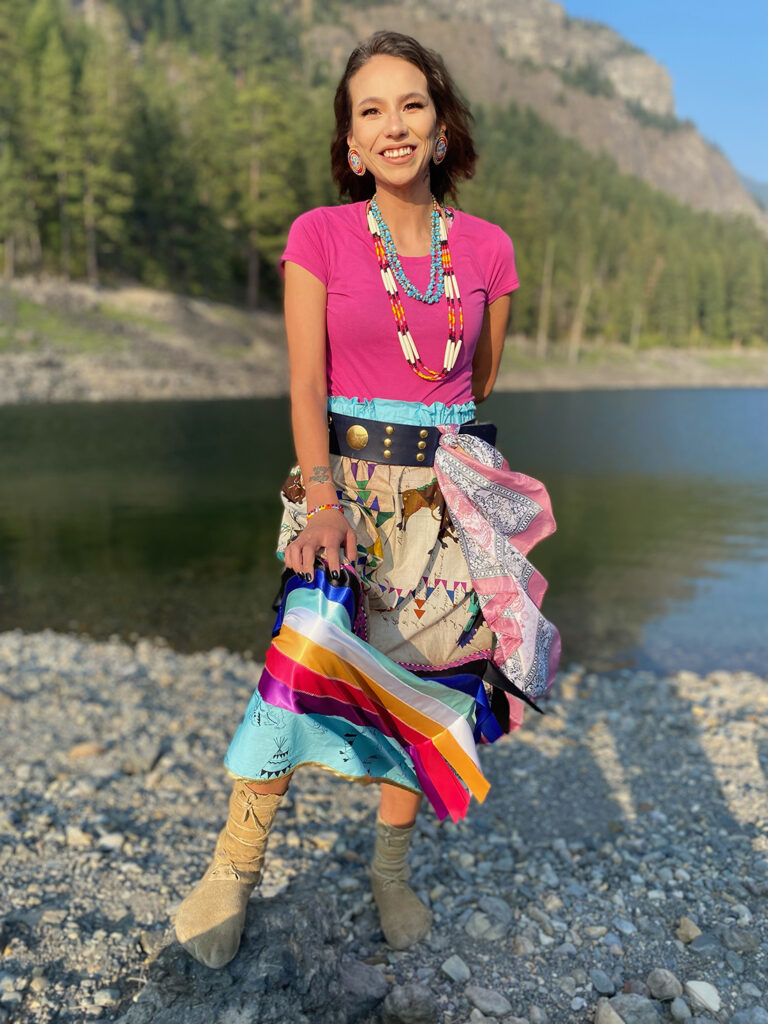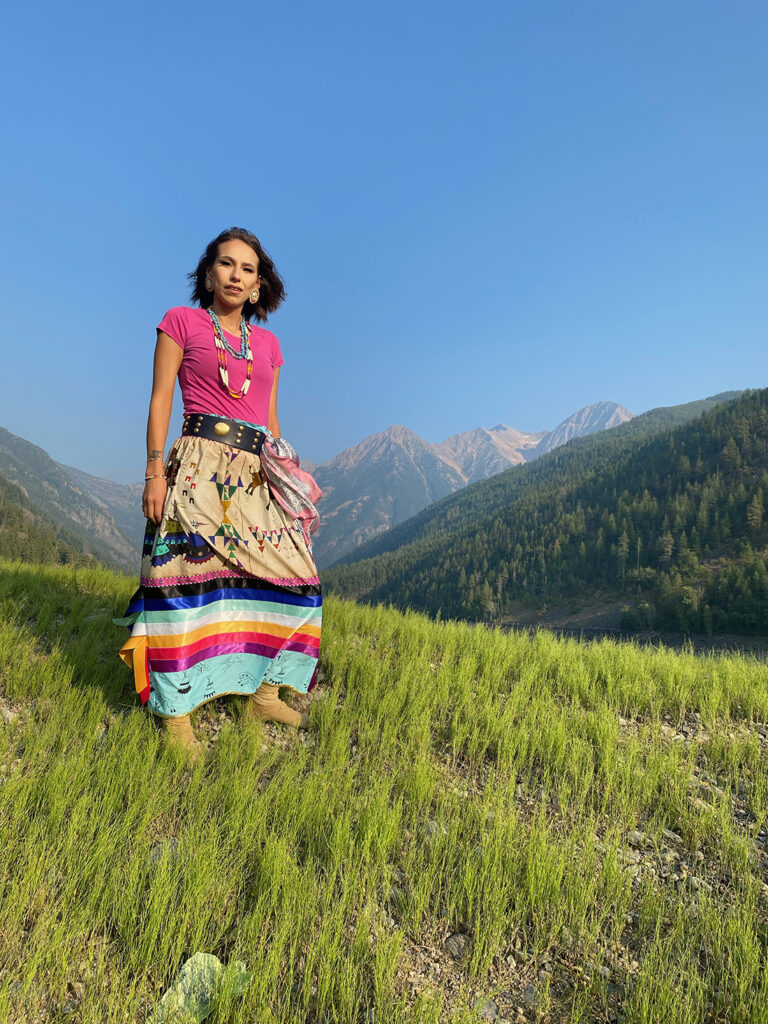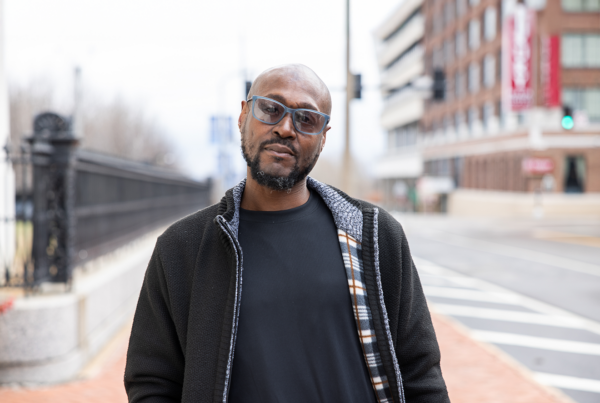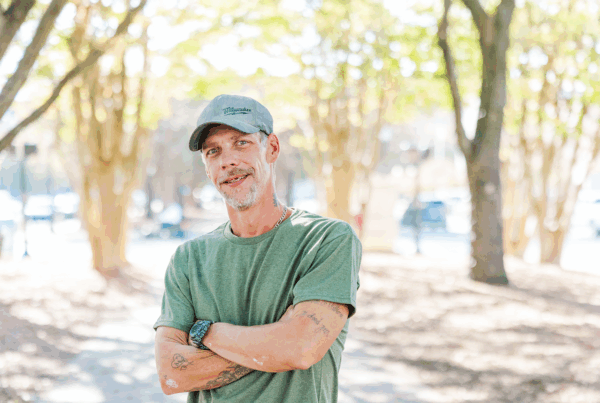Ontequa, 29, a member of the Bitterroot Salish Tribe, remembers her maternal grandmother speaking to her when she was a child in their native language. Her grandmother was her strongest tie to her cultural heritage.
“My Yaya worked at two of the schools here in the valley,” Ontequa said, referring to her grandmother. “She was a Salish language teacher. I thought it was common [to speak Salish].”
In recent decades, Salish youth and young adults have been advocating for resources to help keep their native language, which is considered critically endangered, alive. There are as few as 18 fluent Salish language speakers left. Ontequa’s embrace of the Salish language and tradition allows her to honor her grandmother. Studying and speaking her mother tongue has also helped her to find and maintain her sobriety. “It has played a major role in finding out who I am and centering myself while also educating my kids about who we are,” Ontequa said.
Ontequa has been raising her four kids on the Flathead Indian Reservation in Montana, which is home to 5,000 Tribal members from the Salish, Pend d’Oreilles and Kootenai Tribes. Native Americans living in Montana, as well as those who are members of the Flathead Reservation, are disproportionately impacted by a variety of adverse health-related outcomes. For example, on the Flathead Reservation and across the United States, compared to the U.S. population as a whole, Native Americans face higher rates of substance use disorder, death by suicide, unemployment, and prevalence of certain physical illnesses.
Native Americans are also disproportionately incarcerated and subject to higher levels of law enforcement activity.
In the United States, Native Americans are incarcerated at double the rate of the general population and quadruple the rate of white people.
In Billings, the largest city in Montana, only 5% of the population is Native American, yet they make up 27% of the arrests by the police department.
Like the estimated 29.5 million people in the United States who grapple with alcoholism, Ontequa has struggled to maintain her sobriety. She began drinking soon after her grandmother died in 2010. In addition to grieving the loss of her grandmother, a combination of problems deepend the hold alcohol had on her. Several people close to her died by suicide, which took a toll on her mental health. She also could not find full-time work. In 2017, Ontequa was first arrested for nonviolent offenses related to her substance use.
By 2022, Ontequa had begun to put her experiences with the justice system behind her. She was enrolled in college and was receiving straight A’s. One night, though, a celebratory drink led to several more and she found herself encountering law enforcement again. She was arrested and accused of resisting the orders of a peace officer.
After her arrests, Ontequa experienced a justice system that had changed dramatically over the past two centuries. With the establishment of reservations came designated Tribal Courts, which adjudicate cases related to criminal offenses that are alleged to have occurred on Tribal lands by Tribal members. There, Tribal leaders exercise their own methods of justice, with laws and procedures that fall somewhat outside the purview of the U.S. legal system. The Tribal Court system is bound by judiciary regulations that pertain to all courts in the country. They do have some flexibility to operate within traditional values and punishments, but are subject to an overriding federal authority.
The existence of Tribal justice does not exempt Native Americans from encountering the U.S. criminal justice system, however. When Native Americans are accused of crimes outside of Tribal lands, they are processed like anyone else in local, state, and federal courts.

Despite these jurisdictional differences, Tribal and state courts still have some similarities. When adjudicated in both courts, Native Americans are often mandated to adhere to strict court-ordered requirements, like treatment for addiction, curfews, abstinence from drugs and alcohol, and evaluations for mental health and chemical dependency. To comply with court orders, many Native Americans are forced to visit a limited number of social service providers that work on-reservation. However, these providers are often underfunded, creating staffing issues that lead to backlogs and inadequate treatment.
Another thing both courts have in common is cash bail.
For resisting the orders of a peace officer on the reservation, Ontequa was arrested and had bail set at $500, an amount she could not afford. She was detained in Tribal Jail where she was kept inside an 8-by-12 foot cell. “You don’t get outside time. You’re stuck in a little room,” Ontequa recalled. “It’s horrible. It makes you depressed. You feel ashamed. Guilty. Sad.”
Ontequa’s expressions of sadness, shame, and guilt are near-universal experiences for those who are detained pretrial. Though legally presumed innocent and approved for release by a judge, Ontequa remained incarcerated simply because she lacked the financial resources necessary to secure her release. In jail, separated from loved ones and community, her spirits declined. She felt hopeless.
Many people who are jailed because they cannot afford bail choose to plead guilty to the crimes they are charged with, even if they believe they are innocent of the charges. People take these guilty pleas so they can go home and escape the harmful and terrifying realities of incarceration. Many who accept these plea deals discount the fact that a criminal conviction may follow them for the rest of their life, sometimes barring them from access to social services, like student loans and housing.
“I have my family and kids at home. I can’t be here,” Ontequa said, recounting what she worried about while she was incarcerated. “I have school and I have work.”
Ontequa had defense counsel assigned through the Tribal Defenders Office, an organization that provides free legal support to people who are accused of crimes that occur on the reservation. The Tribal Defenders Officer deploys a more robust model of support than most traditional public defenders’ offices that is referred to as “holistic defense.” Through the holistic defense model, most clients are assigned to social workers who can help them address unmet needs and access supportive services.
Ontequa’s public defenders referred her case to The Bail Project and connected her to Cedar Creek, a treatment center that helps people overcome substance use disorders. When we learned Ontequa was incarcerated, we posted her bail. The Bail Project offers free bail assistance to uphold the presumption of innocence and protect people from making legal decisions that can follow them for years to come.

Once her bail was paid, Ontequa was able to return home. Her release lessened the pressure she felt to decide between taking a criminal conviction or pursuing a robust legal defense. Her chances to experience better case outcomes improved also: Research shows that when people are released pretrial, some have their cases dismissed, and those who don’t are less likely to take plea deals or to receive additional jail time if convicted.
Ontequa was thankful to The Bail Project and the opportunity to participate in the outpatient treatment program her public defender referred her to. She is committed to her recovery, despite a lot of turnover amongst the treatment counselors who’ve supported her. Like many communities across the United States, Flathead’s community-based supportive services that address unmet needs like substance use treatment are underfunded. Were community-based services more robustly provided, it’s possible that some of the issues that led to Ontequa’s justice-system involvement could have been prevented.
Since her release, Ontequa has been able to stabilize her life and return to her responsibilities as a student and a mother. Being connected to her family, community, and heritage has helped her maintain her sobriety. She credits much of her post-release success to her reconnection with her native language. She has a new job at the Blue Bay Campground and is participating in the Salish Language Apprentice Program, where she is doing her part to keep her native language alive. Whether she’s driving, in the shower, or taking care of her kids, she speaks the language out loud or in her head.
“I try to name everything I see in Salish and I play language games with my kids at home,” she says. “It’s really awesome to see my 3-year-old catch on so much. She’s way better than I am. It’s rewarding. I can only imagine how my grandmother felt when I was speaking with her.”
Thank you for reading. The Bail Project is a 501(c)(3) nonprofit organization that is only able to provide direct services and sustain systems change work through donations from people like you. If you found value in this article, please consider supporting our work today.











